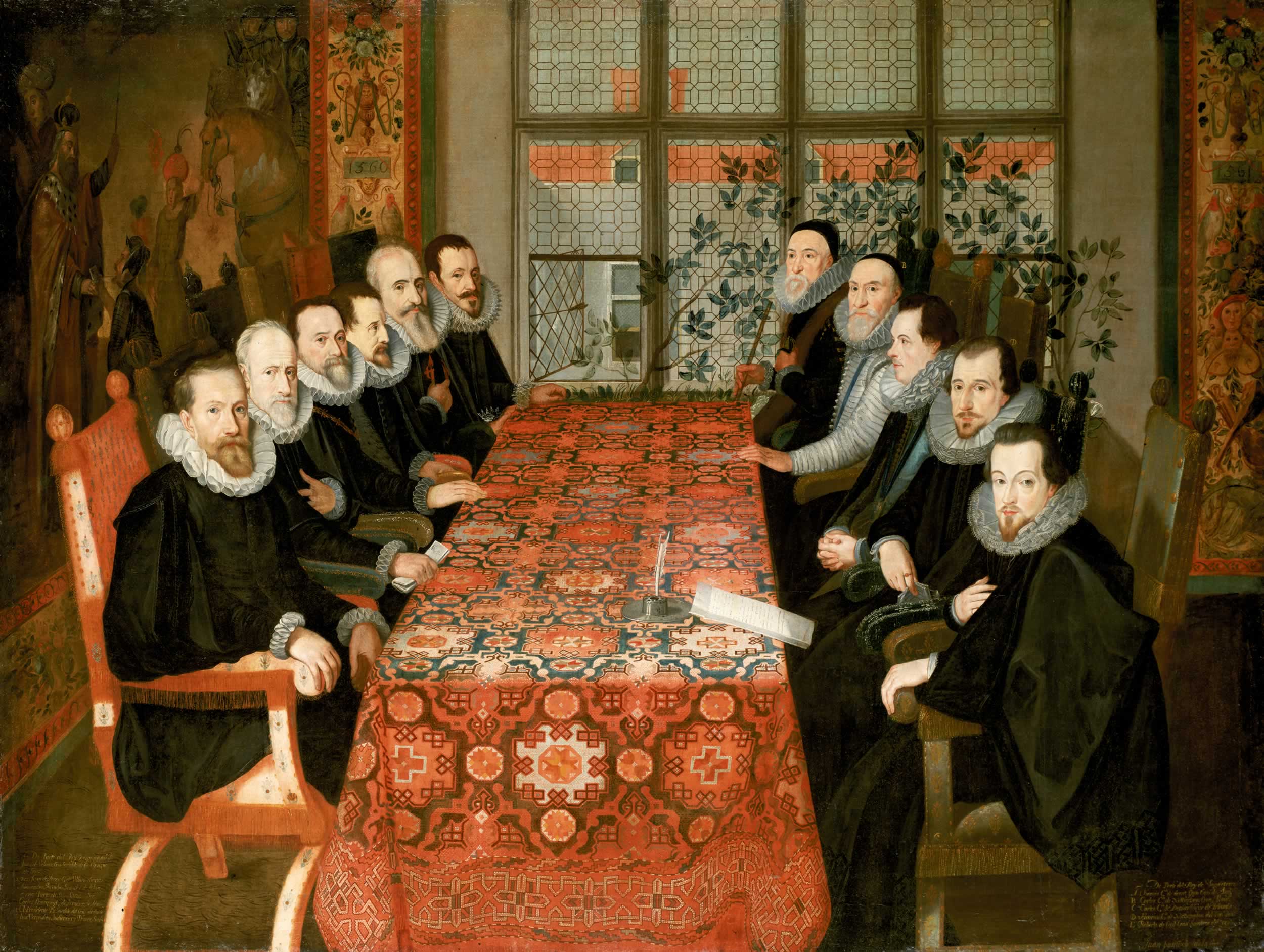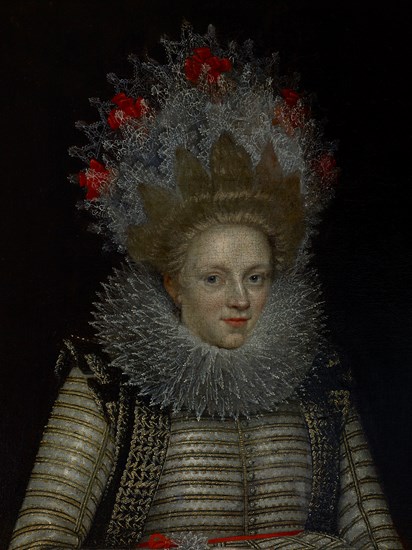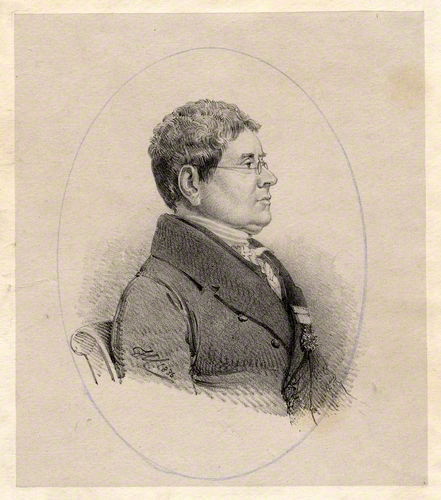|
Blanche Swansted
Blanche Swansted or Swanstead was a hairdresser and tirewoman to Elizabeth I, Anne of Denmark, and Elizabeth Stuart, Queen of Bohemia, Princess Elizabeth. In 1603, she travelled to Berwick-upon-Tweed to meet Anne of Denmark, the queen consort of James VI and I. A tire was a dressing for hair including a wire frame, jewels, and ribbons. Much of what is known about Blanche Swansted comes from the petitions she wrote for payment following the death of Anne of Denmark in 1619 and in 1620s. She had been a tirewoman to Princess Elizabeth and had a fee of 2 shillings daily. A petition in The National Archives (United Kingdom), The National Archives gives more information on her career. At the Union of Crowns in 1603, James VI and I travelled to London from Scotland, leaving Anne of Denmark and his children in Scotland. In April 1603 he ordered that some of Elizabeth's jewels, and a hairdresser, Blanche Swansted, should be sent to Berwick-upon-Tweed so that Anne of Denmark would appear lik ... [...More Info...] [...Related Items...] OR: [Wikipedia] [Google] [Baidu] |
Elizabeth I
Elizabeth I (7 September 153324 March 1603) was Queen of England and Ireland from 17 November 1558 until her death in 1603. Elizabeth was the last of the five House of Tudor monarchs and is sometimes referred to as the "Virgin Queen". Elizabeth was the daughter of Henry VIII and Anne Boleyn, his second wife, who was executed when Elizabeth was two years old. Anne's marriage to Henry was annulled, and Elizabeth was for a time declared illegitimate. Her half-brother Edward VI ruled until his death in 1553, bequeathing the crown to Lady Jane Grey and ignoring the claims of his two half-sisters, the Catholic Mary and the younger Elizabeth, in spite of statute law to the contrary. Edward's will was set aside and Mary became queen, deposing Lady Jane Grey. During Mary's reign, Elizabeth was imprisoned for nearly a year on suspicion of supporting Protestant rebels. Upon her half-sister's death in 1558, Elizabeth succeeded to the throne and set out to rule by good counsel. She ... [...More Info...] [...Related Items...] OR: [Wikipedia] [Google] [Baidu] |
National Records Of Scotland
National Records of Scotland ( gd, Clàran Nàiseanta na h-Alba) is a non-ministerial department of the Scottish Government. It is responsible for Civil registry, civil registration, the census in Scotland, demography and statistics, family history, as well as the national archives and historical records. National Records of Scotland was formed from the merger of the General Register Office for Scotland and the National Archives of Scotland in 2011; it combines all the functions of the two former organisations. The offices of Registrar General for Scotland and Keeper of the Records of Scotland remain separate, but since 2011 both have been vested ''Ex officio member, ex officio'' in the Chief Executive of National Records of Scotland, currently Paul Lowe. Location National Records of Scotland is based in HM General Register House on Princes Street in the New Town, Edinburgh, New Town in Edinburgh. The building was designed by Robert Adam for the Register House Trustees; it was o ... [...More Info...] [...Related Items...] OR: [Wikipedia] [Google] [Baidu] |
British Hairdressers
British may refer to: Peoples, culture, and language * British people, nationals or natives of the United Kingdom, British Overseas Territories, and Crown Dependencies. ** Britishness, the British identity and common culture * British English, the English language as spoken and written in the United Kingdom or, more broadly, throughout the British Isles * Celtic Britons, an ancient ethno-linguistic group * Brittonic languages, a branch of the Insular Celtic language family (formerly called British) ** Common Brittonic, an ancient language Other uses *''Brit(ish)'', a 2018 memoir by Afua Hirsch *People or things associated with: ** Great Britain, an island ** United Kingdom, a sovereign state ** Kingdom of Great Britain (1707–1800) ** United Kingdom of Great Britain and Ireland (1801–1922) See also * Terminology of the British Isles * Alternative names for the British * English (other) * Britannic (other) * British Isles * Brit (other) * Briton (d ... [...More Info...] [...Related Items...] OR: [Wikipedia] [Google] [Baidu] |
Court Of James VI And I
A court is any person or institution, often as a government institution, with the authority to adjudicate legal disputes between parties and carry out the administration of justice in civil, criminal, and administrative matters in accordance with the rule of law. In both common law and civil law legal systems, courts are the central means for dispute resolution, and it is generally understood that all people have an ability to bring their claims before a court. Similarly, the rights of those accused of a crime include the right to present a defense before a court. The system of courts that interprets and applies the law is collectively known as the judiciary. The place where a court sits is known as a venue. The room where court proceedings occur is known as a courtroom, and the building as a courthouse; court facilities range from simple and very small facilities in rural communities to large complex facilities in urban communities. The practical authority given to the co ... [...More Info...] [...Related Items...] OR: [Wikipedia] [Google] [Baidu] |
Jewels Of Anne Of Denmark
The jewels of Anne of Denmark (1572–1619), wife of James VI and I and queen consort of Scotland and England, are known from accounts and inventories, and their depiction in portraits by artists including Paul van Somer. A few pieces survive. Some modern historians prefer the name "Anna" to "Anne", following the spelling of numerous examples of her signature. Goldsmiths and jewellers James VI and Anne of Denmark were married by proxy in August 1589 and in person when they met at Oslo. Lord Dingwall and the King's proxy, the Earl Marischal bought a jewel in Denmark, given to her at "the time of the contracting of the marriage". A diamond ring was involved in these ceremonies, described as "a great ring of gold enamelled set with five diamonds, hand in hand in the midst, called the espousall ring of Denmark". This ring, and a gold jewel with the crowned initials "J.A.R" picked out in diamonds, were earmarked as important Scottish jewels and brought to England by King James in 1603, ... [...More Info...] [...Related Items...] OR: [Wikipedia] [Google] [Baidu] |
Somerset House
Somerset House is a large Neoclassical complex situated on the south side of the Strand in central London, overlooking the River Thames, just east of Waterloo Bridge. The Georgian era quadrangle was built on the site of a Tudor palace ("Old Somerset House") originally belonging to the Duke of Somerset. The present Somerset House was designed by Sir William Chambers, begun in 1776, and was further extended with Victorian era outer wings to the east and west in 1831 and 1856 respectively.Humphreys (2003), pp. 165–166 The site of Somerset House stood directly on the River Thames until the Victoria Embankment parkway was built in the late 1860s. The great Georgian era structure was built to be a grand public building housing various government and public-benefit society offices. Its present tenants are a mixture of various organisations, generally centred around the arts and education. Old Somerset House 16th century In the 16th century, the Strand, the north bank of the Th ... [...More Info...] [...Related Items...] OR: [Wikipedia] [Google] [Baidu] |
Piero Contarini
Piero or Pietro Contarini (1578–1632) was a Venetian aristocrat and ambassador to Turin, Paris, London, Madrid and Rome. Life Pietro Contarini was born in Venice on 12 November 1578 to the noble Contarini family. He made a rapid diplomatic career at the service of the Republic of Venice, been sent from 1606 to 1608 to rapresent the Republic in Turin at the court of Charles Emmanuel I, Duke of Savoy, and from 13 December 1613 to 11 September 1616 in Paris at the court of Louis XIII. Back to Venice, on 30 August 1617 he was sent to London for an extraordinary diplomatic mission, in order to obtain the support of England to Venice who considered itself threaten by the Habsburg Empire. After this mission, Contarini was sent as ambassador in Spain and on 24 January 1619 he entered in Madrid, where he remained for two years. Returned to Venice for some months he was incharged of the rule of Brescia. Contarini was consedered a conservative catholic near to the position of papacy, ... [...More Info...] [...Related Items...] OR: [Wikipedia] [Google] [Baidu] |
Anne Livingstone, Countess Of Eglinton
Anne Livingstone, Countess of Eglinton (died 1632) was a Scottish courtier and aristocrat, and lady-in-waiting to Princess Elizabeth and Anne of Denmark. Anne Livingstone was a daughter of Alexander Livingstone, 1st Earl of Linlithgow and Helenor Hay, who were the keepers of Princess Elizabeth at Linlithgow Palace. At court Livingstone went to England in the household of Princess Elizabeth in 1603. She, or perhaps Princess Elizabeth herself, kept an account of expenses for clothing, jewels, gifts, and writing equipment written in Scots language while travelling from Scotland in italic handwriting. It mentions Newcastle, York, Leicester, Windsor, Nonsuch, Oatlands, Winchester, Salisbury, and Coombe Abbey. The purchases include "a pair of whalebone bodies, the one side of taffeta, the other of canvas" for 20 shillings. The account records gifts to the writing master and dancing master at New Year. When the court was at Winchester in September 1603 the queen ordered fabrics for ne ... [...More Info...] [...Related Items...] OR: [Wikipedia] [Google] [Baidu] |
Jemma Field
Jemma Field is a historian and art historian from New Zealand. She studied for her PhD with Erin Griffey at the University of Auckland. She was subsequently a Marie Skłodowska-Curie postdoctoral fellow at Brunel University, London. She is currently Associate Director of Research at the Yale Center for British Art. Field's published work concerns the material culture of Anne of Denmark, queen consort of Scotland, and wife of James VI and I. Like many modern writers she prefers the use of the forename "Anna" instead of "Anne". Her ideas about Anne of Denmark's personal piety and religious views, and the role of her Danish chaplain Johannes Sering, contribute to contemporary debate. Field examines the ways in which Anne of Denmark expressed her identity and agency through her own dress and bodily ornament, including her jewellery, and also the costume of her servants and household, which reflected both the customs of Scotland and the royal court of Denmark and the House of Olden ... [...More Info...] [...Related Items...] OR: [Wikipedia] [Google] [Baidu] |
Anne Of Denmark
Anne of Denmark (; 12 December 1574 – 2 March 1619) was the wife of King James VI and I; as such, she was Queen of Scotland The monarchy of the United Kingdom, commonly referred to as the British monarchy, is the constitutional form of government by which a hereditary sovereign reigns as the head of state of the United Kingdom, the Crown Dependencies (the Bailiw ... from their marriage on 20 August 1589 and Queen of England and Ireland from the union of the Scottish and English crowns on 24 March 1603 until her death in 1619. The second daughter of King Frederick II of Denmark and Sophie of Mecklenburg-Güstrow, Anne married James at age 14. They had three children who survived infancy: Henry Frederick, Prince of Wales, who predeceased his parents; Elizabeth Stuart, Queen of Bohemia, Princess Elizabeth, who became Queen of Bohemia; and James's future successor, Charles I of England, Charles I. Anne demonstrated an independent streak and a willingness to use fa ... [...More Info...] [...Related Items...] OR: [Wikipedia] [Google] [Baidu] |
Henry Ellis (librarian)
Sir Henry Ellis (29 November 177715 January 1869) was an English librarian and antiquarian, for a long period principal librarian at the British Museum. Early years Born in London, Henry Ellis was educated at the Mercers' School, and at Merchant Taylors' School, where his brother, the Rev. John Joseph Ellis, was assistant-master for forty years. Having gained one of the Merchant Taylors' exhibitions at St John's College, Oxford, he matriculated in 1796. Librarian In 1798, through his friend John Price, Ellis was appointed one of the two assistants in the Bodleian Library, the other being his future colleague in the British Museum Henry Hervey Baber. He took the degree of B.C.L. in 1802. He was a Fellow of St John's till 1805. In 1800 he was appointed a temporary assistant in the library of the British Museum, and in 1805 he became assistant-keeper of printed books under William Beloe. The theft of prints which cost Beloe his appointment in the following year raised Ellis to t ... [...More Info...] [...Related Items...] OR: [Wikipedia] [Google] [Baidu] |
Union Of Crowns
The Union of the Crowns ( gd, Aonadh nan Crùintean; sco, Union o the Crouns) was the accession of James VI of Scotland to the throne of the Kingdom of England as James I and the practical unification of some functions (such as overseas diplomacy) of the two separate realms under a single individual on 24 March 1603. Whilst a misnomer, therefore, what is popularly known as "The Union of the Crowns" followed the death of James's cousin, Elizabeth I of England, the last monarch of the Tudor dynasty. The union was personal or dynastic, with the Crown of England and the Crown of Scotland remaining both distinct and separate despite James's best efforts to create a new imperial throne. England and Scotland continued as two separate states sharing a monarch, who directed their domestic and foreign policy, along with Ireland, until the Acts of Union of 1707 during the reign of the last Stuart monarch, Anne. However, there was a republican interregnum in the 1650s, during which th ... [...More Info...] [...Related Items...] OR: [Wikipedia] [Google] [Baidu] |

.jpg)





